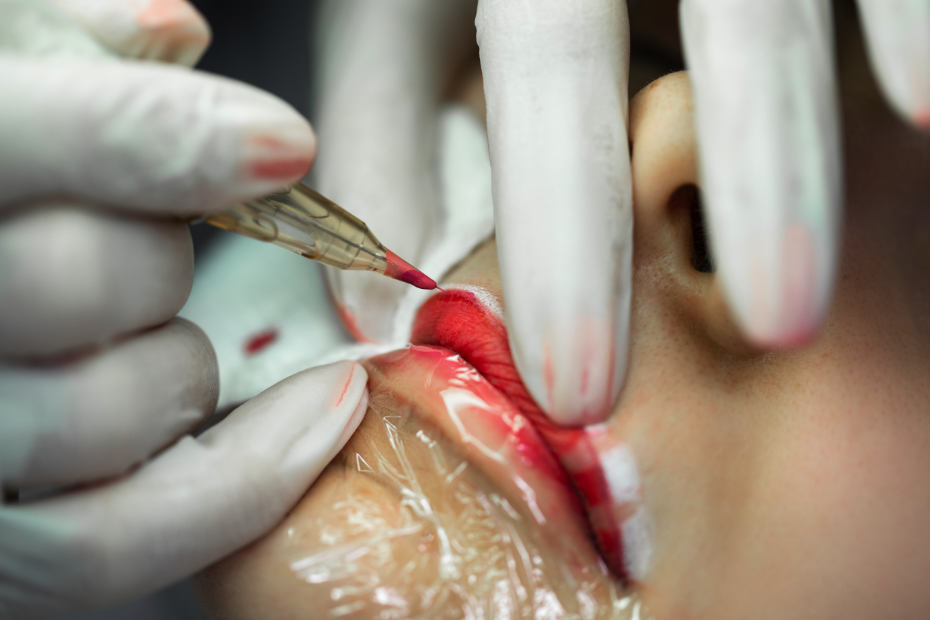Lip tattoos, including lip blush and inner lip tattoos, have become increasingly popular for those looking to enhance their lips with long-lasting colour or add a fun tattoo. While these lip tattoos can create stunning results, but it’s essential to know if they affect your oral health. Our blog explores the potential impacts of lip tattoos on your mouth, teeth, and gums.
Potential Risks Of Lip Tattoos On Oral Health
While lip tattoos are generally safe when performed by a professional, they do come with some potential oral health risks:
1. Infection and Healing Complications
The mouth is filled with saliva and bacteria, which can increase the risk of infection. If you do not continue with proper aftercare as instructed by your tattooist, a lip tattoo could potentially lead to swelling, prolonged healing, or even an oral infection. Following hygiene recommendations and using antiseptic mouthwash, alongside your guided instructions, can help reduce these risks.
If you have an infection, you should speak to a GP or dentist for medical advice. Some symptoms to look out for are:
- Bad breath
- A bitter taste in your mouth
- A fever
- Teeth sensitivity to hot or cold food and drink
- Swelling of the gum, glands of the neck, or jaw
Touch-ups are also not recommended for tattoos inside the mouth because this increases your infection risk.
2. Gum Sensitivity and Irritation
For inner lip tattoos, the tattooing process may cause temporary gum irritation or sensitivity. This can be more noticeable if you have pre-existing gum issues or sensitive teeth.
3. Risk of Allergic Reactions
Some people may have an allergic reaction to tattoo pigments, leading to inflammation, itching, or discomfort. Since the lips are highly sensitive, allergic reactions in this area can be more intense than in other parts of the body. Before getting the tattoos, ask your tattoo practice if you can get an allergy test to check beforehand.
4. Fading and Re-Touching
Inner lip tattoos fade faster than tattoos on other body parts due to constant friction, saliva exposure, and the quick healing of the lips’ delicate skin. Touching them up frequently could also lead to irritation and repeated contact to tattooing tools.
5. Impact on Oral Hygiene
Immediately after getting a lip tattoo, brushing your teeth and using mouthwash might feel uncomfortable. However, maintaining your oral hygiene routine is crucial to preventing bacteria buildup that could slow the healing process down. Additionally, opting for an alcohol-free mouthwash can help reduce irritation. Ensure you’re using mouthwash after consuming food to get rid of any lingering bacteria and help minimise any infection.
How To Care For A Lip Tattoo To Protect Oral Health
Correct aftercare can minimise risks and help your lip tattoo heal smoothly:
- Avoid spicy, acidic, or salty foods for a few days to prevent irritation.
- Refrain from smoking or drinking alcohol, as these can slow down healing.
- Use a gentle, alcohol-free mouthwash to maintain oral hygiene without causing stinging.
- Keep the area clean and avoid touching it with dirty hands.
- Apply any recommended healing ointments as directed by your tattoo artist.
When tattooed by a professional, with correct aftercare in place, lip tattoos are generally safe and do not pose serious oral health risks. However, they do require proper aftercare to prevent infections, irritation, and excessive fading. If you have concerns about how a lip tattoo might affect your oral health, consult with both a licensed tattoo artist and your dentist for personalised advice. If you have any questions or queries, please contact our expert and friendly team at Sandhurst’s Owlsmoor Dental practice.

